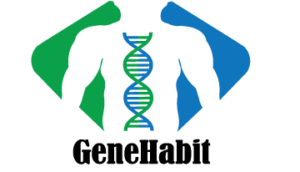6 Reasons You’re Not Losing Weight – Understand Genetics, Diet, & Lifestyle
It’s all about understanding your Genetics, Diet, and Lifestyle!!
Are you unsatisfied with your body weight or unable to shred weight even after eating healthy and working out? It’s time to understand your body metabolism and genetics as both play a major role in regulating our body weight.
Here are 6 possible reasons that might be hindering your weight loss:
- Your genes may be the reason for your slow weight loss.Studies suggest that your genes contribute to 40-70% of obesity; scientists have found more than 50 genes that are strongly associated with obesity or fat deposition. An individual with variants of these genes is at high genetic risk of obesity or access to weight gain.It’s good to get your genetic testing done to detect any obesity risk or fat-causing genes. This will help you to customize your diet and exercise to lead a healthy life.
- You’re following a diet that doesn’t meet your body or genetic makeupOften diet plans are a bit of a hit and trial to see which diet helps to reduce weight. One size fits all approach does not help your weight loss goals as each individual has a unique genetic profile. Gene variations determine the optimal type of diet for an individual. Some individuals would benefit from a high protein diet, some with low carbs and fats while others from a diet rich in healthy fats.You may not be aware but your taste preferences directly impact weight as it affects your like or dislike towards a particular food type. For example, people with strong sweet taste preferences consume more sweet stuff or desserts; this can cause weight gain and other metabolic disorders.As per studies your genes directly impact your taste buds so it’s good to know about your taste perception with GeneHabit DNA test to avoid obesity risk.Similarly, genes also regulate your food sensitivities at a large scale as proven in recent studies. People with lactose intolerance suffer bloating and other gut issues.

- Are you working out in the right way?Have you noticed that some people’s body responds to the exercise and workout plan effortlessly, while others try so hard for months at the gym and do not see any results?Your sedentary lifestyle is one of the major hurdles for your inability to lose weight, especially during this pandemic. Apart from lifestyle your genes also affect your sedentary behavior or exercise aversion that leads you to obesity.People with certain genes lose more weight to a specific type of exercise. You might not be doing the right exercise that is optimal for weight loss.For example; some people lose more weight with endurance exercise whereas some other individuals can shred his/her weight with aerobic exercise. We will help you to understand what exercise type would suit you depending upon your genes for weight loss.
This bowls down to fact that the genetic risk of obesity can be mitigated by leading a healthier lifestyle. Research shows that regular exercise, healthy eating, and certain lifestyle changes can deactivate the genes that make you put on weight.

- You may not be meeting your essential nutrient requirements.Essential nutrients play key roles in our body’s metabolism. If you aren’t getting all your vitamins and minerals, a slow metabolism will also contribute to progressive unwanted weight gain.Your genes play a major role in influencing macronutrient deficiencies as discovered in the latest studies. For example; Vitamin C deficiency is regulated by a genetic change in the BCMO1 gene under which your body is unable to covert Vitamin C into a usable form. Thus slowing down fat metabolism leading to obesityKeep your nutrient deficiencies in check with the GeneHabit DNA test and personalized recommendations.

- You’ve hit a weight loss plateauPeople with a strong genetic predisposition to obesity may not be able to lose weight with the usual forms of diet and exercise therapy. Hence you need to keep a track of your diet and exercise to break this weight plateau.Performing exercise, especially strength training, can help offset the drop in metabolic rate that occurs during weight loss. Endurance, Power, Strength, or Moderate exercise suits you.Tracking your calorie and macronutrient intakes can provide accountability and help in breaking the weight plateau.The increased cortisol production that’s associated with stress can interfere with weight loss. Stress-reduction strategies may help promote weight loss.
- Keep a check on your sleep durationSleeping for more than 9 hours and less than 7 hours can impact your food cravings and midnight snacking at odd hours leads you to risk of obesity and makes it difficult for you to lose weight.Researchers have identified specific genes that trigger the development of sleep problems, disturbed circadian rhythms and have also demonstrated a genetic link between insomnia and weight gain.Your caffeine intake also influences your sleep. Your genes play a major role in caffeine metabolism. So if you are a slow metabolizer intake of caffeine post evening impacts your sleep which directly impacts your weight.
- Your mental health and working environment impact your weight directly!We all live in high-stress situations. You may not know or observe but stress affects your body weight by leading you into stress eating, binge eating, and eating comfort food habits. Thus it makes a herculean task for you to lose weight.Stress is not only a lifestyle-related factor but our genes also play a prominent role in how we react to stressful events in life. You must have seen few people cope with work pressure easily where other individuals crumble down emotionally this is decided by the action of your neural genes.Stress is not avoidable but manageable with GeneHabit DNA test and a healthy lifestyle.

How Genetic testing can determine the genetic risk of obesity or weight issues?
Understanding your genetic profile and susceptibility to weight gain can provide long-term health benefits.
GeneHabit enables you to influence your BMI and blood lipids by regulating your dietary intake and your physical activity.
We will encourage you to manage your diet and increase your exercise to control your weight.
At Genehabit we have developed a personalized genetic test to let you know about your genetic obesity risk with personalized recommendations for more details visit our products,
- GeneFit – GeneFit provides a 360 degree personalized genetic insight about your lifestyle and fitness risks that include – the risk of extreme weight gain or loss, nutritional deficiencies, food sensitivities, optimal physical activities, sleep, and stress. Click here to read more about the GeneFit test.
- NutriLife – NutriLife DNA test identifies your nutritional requirements of vitamins and minerals based on your genetic profile. NutriLife DNA test report provides personalized recommendations for nutrient intake by including recommended food sources in your diet. Your food allergies or sensitivities along with taste perception are also identified to maximize health benefits. Click here to read more about NutriLife test.
- FitLife – FitLife DNA test identifies your fitness attributes – the optimal type of exercise, aerobic capacity, and injury risk for you to achieve desired fitness level. Discover genetic insights in your DNA that can transform your choice of workouts and training for optimal fitness. Click here to read more about the FitLife test.
- HairLife – HairLife DNA test identifies your risk of premature hair loss, greying, and thinning due to genetic factors, nutritional deficiencies, and stress. HairLife DNA test identifies the specific type of hair issues that you are suitable for and recommends preventive action to keep your hair healthy and nourished. Your personalized DNA report provides recommendations for hairstyles, nutrition recommended supplements, and hair care products. Click here to read more about the HairLife test.
- SkinLife – SkinLife DNA test provides comprehensive, personalized genetic insights into your skin type and your risk of premature aging, sun damage, allergies, and more. Click here to read more about SkinLife test.
For your queries and questions visit our FAQ section, or contact our experts for personalized plans and recommendations.







